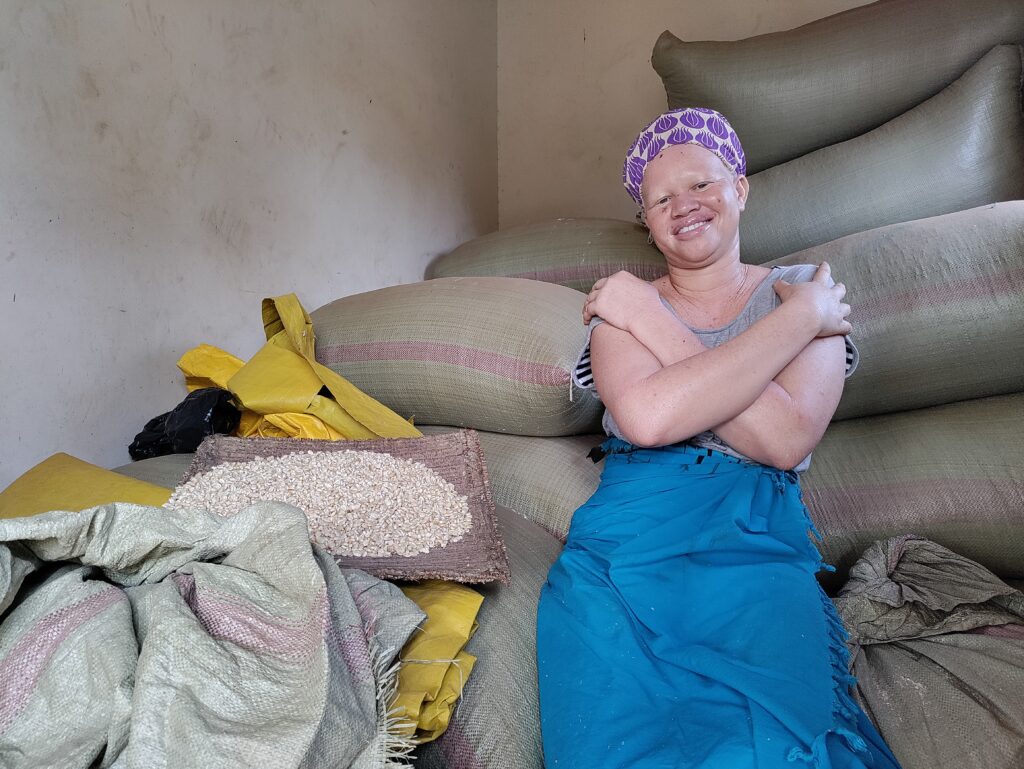As women increasingly participate in the Ugandan economy, their contribution to the country’s development grows. Gender inclusion is a core tenet of Cordaid’s work and is integrated across our programming. For instance, in Uganda’s Lira district, gender inclusion is central to strengthening agrifood systems for improved food security, nutrition, and income across the surrounding region.

Martha Awor, 30, is one of the 1400 young agripreneurs supported through the Futuremakers programme. This global initiative tackles inequality by offering training in business development skills, mentorship, and market linkage to revive, strengthen, and build business resilience.
Martha is a farm-produce dealer in Odokomit, Lira City West, Uganda. She began her produce buying-and-selling business in 2019 after being laid off from her previous job amid the organisational adjustments and downsizing triggered by the COVID-19 pandemic.
After losing my contract, I wanted to keep a steady source of income, so I joined a savings group called Kisarwot.
Now, her produce business employs two people who assist Martha with sorting, packaging, loading, and delivering the produce.
Business training for agripreneurs
Martha regards COVID-19 as a key motivating factor in her shift to a more business-focused perspective: “After losing my contract, I wanted to keep a steady source of income, so I joined a savings group called Kisarwot. Over the course of a year, I accumulated one million Uganda shillings (USD 278), which I subsequently withdrew and used to begin purchasing and selling produce.”
Cordaid’s financial literacy training has also helped catapult Martha’s business to new heights.
“Throughout the training, I was exposed to the culture and benefits of saving, even for tiny amounts of money. This opened my eyes to the money I was losing by not saving effectively and how much it harmed my business”.
Cordaid also linked Martha to a business mentor who offers her ongoing technical support and critical advice. She says this has helped her to expand her business and make it a success.
Three major obstacles
The farm produce business is particularly challenging for someone like Martha. There are three major obstacles she must contend with. Firstly, she notes that the internal road systems are inadequate, which raises the price for her to transport her agricultural products. Secondly, the changing climate increases the frequency of extreme weather events such as drought, floods, and high winds. These intense weather events progressively degrade soils and landscapes, which lowers their carrying capacity and, eventually, food yields – directly impacting numerous locals’ access to food and way of life.
I must purposefully minimise my exposure to the sun owing to the intensity of solar rays.
Such conditions not only harm crops and communities, but they also present the third (and personal) obstacle to Martha and other agripreneurs like her who have Albinism. Under certain persisting weather extremes, Martha must avoid going outside to buy agro-produce; the sun’s intense heat on bright days poses a risk to people with albinism. “I send people to get produce for me during the dry and hot seasons,” says Martha. “I must purposefully minimise my exposure to the sun owing to the intensity of solar rays. But, of course, acquiring the greatest quality and pricing is challenging without me at the negotiating table.
Overcoming the challenges
Against these odds, Martha is preparing to take her business to the next level. She intends to use various marketing incentives to build and retain her client base, which is growing daily. She also plans on leveraging social media to attract more clients by creating and customising a digital marketing strategy for her company. As Martha’s business currently operates from Odokomit village (with limited storage space), she’s looking to open a larger store in the middle of Lira City, where her agro-produce will be readily available and her business can thrive.